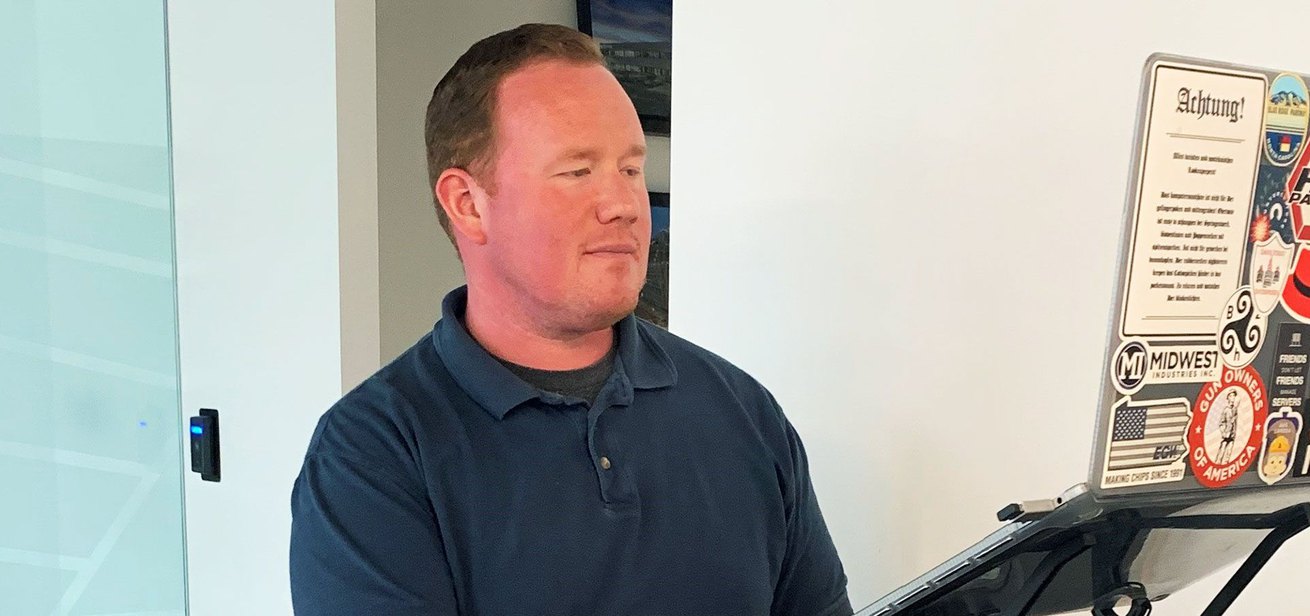
#communityovereverything: Meet Phillip Lamb
Phillip Lamb has worked for presidential campaigns, French supermarkets, and media companies. He's lived everywhere from Raleigh, NC to Paris, France. Though he's currently working full time as a solutions architect, no matter where he's lived or what his full-time work situation is he has maintained a steady workload as a freelance web development consultant. Lamb, who recently moved to Plano, TX from Raleigh, NC, spends his working days at CityCentral’s coworking location in Richardson, TX.
I spoke with Phillip about his career, how freelancing keeps him sharp, and his advice for other web developers and freelancers.
SB: So tell me about your career, what is the difference between your full-time job and your consulting job?
PL: So I’m currently a Senior Solutions Architect for Red Hat Global Partners and Alliances, but on the side I do freelance web development for a handful of clients. My full-time job pays the rent, basically, but the consulting stuff keeps me sharp. It’s like, I have to stay in tune — it’s like being a doctor when you’re in web development. It’s very similar in that you have to stay abreast of everything that’s going on, because if you don’t — there’s new technologies coming out every day and if you don’t keep up with it then you’re very quickly a dinosaur.
SB: I know that you spent some time in France, how did that come about and how did that change your work? Were you able to keep your full-time job when you were over there?
PL: We lived there for seven years. I met my wife in New York, and then we moved to France to have our kids (she is French). I’d had a full-time position but the hours are just impossible because of the time difference. So I started doing consulting work for a number of different media companies like France24. I worked for them for a bit, I worked for a couple of administrative health, and also kind of ended my foray in France in working for a company called Carrefour which is like a Walmart.
SB: How has your consulting experience helped you in your full-time role?
PL: It really helped my current job as a Solutions Architect to have all my experience in talking to my potential customers and trying to convince them that “hey, this is a good direction to go”, and all this stuff that I kind of learned from that was really beneficial. I leverage that all the time.
SB: What kind of advice do you have for other consultants and freelancers?
PL: My advice would be get a good accountant and make sure you’re paying on time because otherwise it gets ahead of you real fast. The other thing, and this is a really important tip if you’re just getting started with this sort of thing, don’t lowball. Because if you are—if there’s a candidate pool of ten people who are going to do a job and you are the cheapest, and it’s by a large margin, they’re going to be like, “why is it so cheap? That’s weird?” So that’s what I’ve found out, you need to be expensive. If you’re not expensive then there’s just this whole, weird psychological thing that goes on where you won’t get the project and your reputation kind of suffers.
SB: What’s the most challenging part of consulting work?
PL: Asking for money. Especially if somebody is behind on paying, which – spoiler alert, lots of companies take their sweet time — and that’s also something that kind of figures in there or factors into that is that you never release any code, whatsoever, to a client until they pay you in full. You can provide them with an environment that you are managing and that they can go in and poke things so they can prove that it works, which is totally fair, but never have that go live on your own infrastructure, make sure that they do it. And then the hand-off point is when it switches over to their infrastructure and they’re the ones that are paying for it, and that only happens after you get the full amount paid in. It was really hard for me in the beginning to have to send out those reminder emails like, “hey, by the way, you owe me $10,000, where is it?”
Never release any code, whatsoever, to a client until they pay you in full.
Get a lawyer, don’t go on Rocket-whatever-it-is, get an actual, contractual lawyer and have him or her sit down with you, and you tell them what it is you do, what’s in the contract and they’ll know all the questions to ask, basically. And make sure that contract is ironclad. It’s going to cost you money but it will save you so much heartache down the road.
SB: So you work remotely and could work from home, but you prefer to cowork at CityCentral in Richardson, what do you like about coworking?
PL: I love getting exposure to lots of different people outside of the people at my company or my clients. I think a healthy ecosystem is a diverse one, and I often find that I get great ideas from talking to people who aren’t part of my ‘regular’ day-to-day.
--
Indy is a platform built for managing your independent business through powerful marketing, workflow, and payment tools, and the latest information, news, and learning resources. CityCentral has a special code for two free months of Indy's Pro Bundle, click here and use the code CITYCENTRAL to register.
